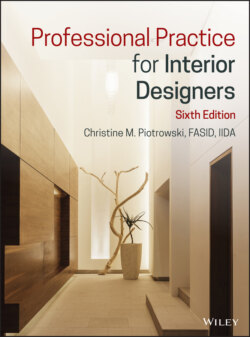Читать книгу Professional Practice for Interior Designers - Christine M. Piotrowski - Страница 149
THE JOB INTERVIEW
ОглавлениеA job interview is a stressful situation regardless of whether you are a student or an experienced professional. All your preparation and hard work have gotten you to this point. You are ready to present yourself and your skills through a personal interview. For some this is a terrifying idea just like standing up to make a speech. Only this “speech” is to one person. This is your chance to make a good impression, to convince the employer that you are the one person in the world who can handle the job.
The planning and preparation for your interview are no less important than any other kind of planning and preparation discussed in this text. The interview is where little things more often than not torpedo a candidate. That is why preparation is so important. The hints and comments in this section, we hope, will help you to achieve success as you move through the interview process.
Let's start with something very basic. Lateness and no‐shows are nearly inexcusable. If for any reason you cannot keep the interview appointment, call and personally talk to the interviewer to tell him or her. Do not be late unless it is due to something totally beyond your control—but if you must be late, be sure you call. To avoid being late, make a point of arriving at the office or studio at least 10–15 minutes early. This will help you relax before you go in to the interview.
A second very important basic part of interviewing is to verify details. Twenty‐four to forty‐eight hours before the interview, call to double‐check on details such as time, the person who will be interviewing you, and how to pronounce his or her name. If you are traveling to another city, find out where to park or how to get to the office.
There are several tasks that you should perform in preparation for your interview.
If you can, clarify if more than one person will be interviewing you. If so, request an agenda, so that you will know how much time you will be spending with each person.
Know the time frame. Initial interviews can be as short as 30 minutes or can last 2 hours, though an hour is the average. In either case, plan to spend about 20 minutes showing your portfolio and the rest of the time answering questions.
Bring a few extra paper copies of your resume just in case they are needed. Also have a pen should you have to fill out any application documents.
Be sure your portfolio is organized and that the digital presentation works flawlessly. Do not count on the employer to have the hardware you need to show your portfolio. Familiarize yourself with what you are going to show the interviewer.
Ensure neat appearance and good grooming. Check the outfit you wish to wear to be sure it is clean and pressed and shoes are shined. As necessary, trim your hair and take care of other personal grooming needs.
Prepare yourself. Your mental preparation includes anticipating and thinking about the kinds of questions the interviewer may ask you and that you may want to ask the interviewer about the company. Some common questions are included at the end of this section.
When you arrive, now you are on stage. Be sure to smile and greet the receptionist in a friendly professional way, tell him your name and, with whom you have an appointment. Most likely, you will be told to have a seat. Try to relax and think positively about the way you will conduct yourself and the outcome of the interview. Try to use this time to compose yourself by reading a magazine. Do not use your cell phone—in fact turn it off before you greet the receptionist—fiddle with your portfolio, briefcase, or handbag.
You may be asked to fill out some type of form that either compliments what they had online, or in addition to that information. Your paper resume copy will help you with this task. Note that this type of document or the job application cannot ask for information that is considered illegal, such as marital status and age. More on that is included later in this chapter.
If you are interviewing out of state, there is a possibility that someone from the office will meet you at the airport. If you are to go right to the office for the interview, you will need to travel in professional business attire. If the interview is the next day, travel in casual business attire, not shorts and t‐shirts! Of course, you will know this ahead of time, and your preparation for this is to travel in professional casual dress or professional apparel if you know you are going right into the interview from the airport. It also helps to know what the person looks like or to arrange a meeting place so you can easily contact this person.
